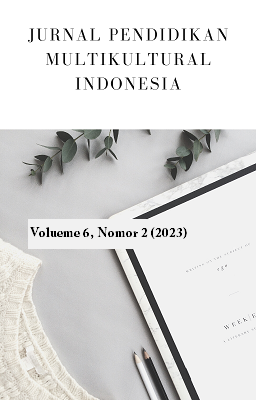Harmony of Monotheism in Becekan Rajab: Exploration of Islamic Education Values in the Mystical Tradition of Javanese Society
DOI:
https://doi.org/10.23887/jpmu.v6i2.65032Keywords:
Values, Islamic Education, Becekan Rajab Traditions, Javanese SocietyAbstract
The society's beliefs in Java regarding traditions related to Islamic education values can be diverse and complex due to Java's rich cultural and historical background with various beliefs. Therefore, it is important to note that each group or community in Java may have different perspectives on traditions and Islamic educational values. This research aims to analyze the history, process, and Islamic educational values found in the Becekan Rajab tradition in Javanese society. The research uses a qualitative method with field research. The results of the study show that the Becekan tradition historically originated from the instinct of an ancestor named Mbah Pucet, the first Village Head of Kaliwungukidul Ngombol Purworejo, around 1930. This tradition is part of the village's traditional ritual or village cleansing, which is held every 27th of Rajab. The series of the Becekan tradition ceremony begins with cleaning the graves, slaughtering a goat at the gravesite, reciting Yasin Tahlil, and holding religious lectures. Islamic educational values present in the Becekan tradition include values of faith, ethics, appreciation for knowledge, humanity, balance, and compassion for all (rahmatan lil’alamin). This research can help Javanese communities understand the Becekan tradition more deeply, including its history, implementation process, and the values it contains. It can broaden people's awareness of local traditions and strengthen their cultural identity.
References
Adam, Y. F., Ramona, E., & Muhsin, I. (2023). Islam Melayu dan Islam Jawa: Studi Komparatif Akulturasi Islam dan Kebudayaan dalam Perspektif Sejarah. Muslim Heritage: Jurnal Dialog Islam Dengan Realitas, 8(1), 134–152. https://doi.org/DOI: 10.21154/muslimheritage.v8i1.5723. DOI: https://doi.org/10.21154/muslimheritage.v8i1.5723
Adinugraha, H. H. (2018). Kearifan Lokal di Pedesaan: Kajian Praktik Budaya Religi Di Desa Nyatnyono. International Journal Ihya’ ’Ulum Al-Din, 20(1), 109–128. https://doi.org/10.21580/ihya.20.1.2997. DOI: https://doi.org/10.21580/ihya.20.1.2997
Anshori, I. (2017). Penguatan Pendidikan Karakter di Madrasah. Halaqa: Islamic Education Journal, 1(2), 63–74. https://doi.org/10.21070/halaqa.v1i2.1243. DOI: https://doi.org/10.21070/halaqa.v1i2.1243
Aqmarina Bella Agustin. (2019). Javanese Muslim Local Culture And Tradition In Islamic Perspective. Sunan Kalijaga International Journal on Islamic Educational Research (SKIJIER), 3(1), 15–24. https://doi.org/https://doi.org/10.14421/skijier.2019.2019.31.02. DOI: https://doi.org/10.14421/skijier.2019.2019.31.02
Asiah, S. (2018). The Values Of Islamic Education In The Tradition Of Tolabalango And Madduta. El Harakah (Terakreditasi), 20(2), 253. https://doi.org/10.18860/el.v20i2.4719. DOI: https://doi.org/10.18860/el.v20i2.4719
Asiyah, A. (2019). Nilai-Nilai Pendidikan Islam Dalam Tradisi Bersih Desa di Purbosari Kecamatan Seluma Barat Kabupaten Seluma. MANHAJ: Jurnal Penelitian Dan Pengabdian Masyarakat, 4(2), 135–145. https://doi.org/10.29300/mjppm.v4i2.2626.
Asutay, M., & Yilmaz, I. (2020). Constituting an Islamic social welfare function: an exploration through Islamic moral economy. International Journal of Islamic and Middle Eastern Finance and Management, 14(3). https://doi.org/10.1108/IMEFM-03-2019-0130. DOI: https://doi.org/10.1108/IMEFM-03-2019-0130
Bullock, K. (2018). Pious Fashion: How Muslim Women Dress. American Journal of Islamic Social Sciences, 35(3). https://doi.org/10.35632/ajiss.v35i3.486. DOI: https://doi.org/10.35632/ajiss.v35i3.486
Dimyati Huda, M. (2022). Religious Synchretism in Paranormal Myths: Study of Javanese Islamic Society in Blitar Regency. International Journal Of Special Education, 37(3), 9789–9803. http://repository.iainkediri.ac.id/id/eprint/658.
Dzo’ul Milal, A., Rohmah, Z., Kusumajanti, W., Basthomi, Y., Sholihah, D. N., & Susilowati, M. (2020). Integrating character education in the english teaching at islamic junior high schools in Indonesia. Teflin Journal, 31(1). https://doi.org/10.15639/teflinjournal.v31i1/88-107. DOI: https://doi.org/10.15639/teflinjournal.v31i1/88-107
Erlangga, R. (2022). Budaya Jawa Islam sebagai Perekat Integrasi Sosial: Studi Budaya Bancakan dan Dekahan Masyarakat Desa Karungan Kecamatan Plupuh Kabupaten Sragen. Habitus: Jurnal Pendidikan Sosialisasi Dan Antropologi, 6(1), 33–35. https://doi.org/https://doi.org/10.20961/habitus.v6i1.60649. DOI: https://doi.org/10.20961/habitus.v6i1.60649
Fahyuni, E. F., & Fauji, I. (2017). Pengembangan Komik Akidah Akhlak Untuk Meningkatkan Minat Baca dan Prestasi Belajar Siswa di Sekolah Dasar. Halaqa: Islamic Education Journal, 1(1), 17–26. https://doi.org/10.21070/halaqa.v1i1.817. DOI: https://doi.org/10.21070/halaqa.v1i1.817
Fajar Kurniawati, M. (2020). Dramaturgi Komunikasi Dolalak pada Perempuan, Pola Pengelolaan Pesan Ritual Penari Dolalak sebagai Kesenian Tradisional Sarana Media Komunikasi dalam Membantu Pemerintah pada Program Pembangunan di Purworejo Jawa Tengah. In Annual Conference of Communication, Media and Culture (ACCOMAC), 2(1), 20–26. http://proceeding.unisba.ac.id/index.php/accomac/article/view/1625.
Fathorrahman. (2018). Kebijakan Pendidikan Islam di Sekolah dan Perguruan Tinggi. AL-IMAN: Jurnal Keislaman Dan Kemasyarakatan, 2(1), 38–65. http://ejournal.kopertais4.or.id/madura/index.php/aliman/article/view/3198.
Fathurrosi, F. (2023). Simbol Masyarakat Melayu Kendawangan Dalam Ritual Tradisi Tijak Tanah (Analisis Sosio Dan Nilai Pendidikan Islam). Indonesian Journal of Social Science Education (IJSSE), 5(1), 80. https://doi.org/10.29300/ijsse.v5i1.10736. DOI: https://doi.org/10.29300/ijsse.v5i1.10736
Fauziah, R. S. P., Maryani, N., & Wulandari, R. W. (2019). Pelaksanaan Model Pendidikan Karakter Di Sekolah Dasar. DIDAKTIKA TAUHIDI: Jurnal Pendidikan Guru Sekolah Dasar, 6(2), 139. https://doi.org/10.30997/dt.v6i2.2133. DOI: https://doi.org/10.30997/dt.v6i2.2133
Fuadah, T., & Syafril, E. P. E. (2022). Nilai Kearifan Lokal Rela Berkorban dan Semangat Kebersamaan dari Tradisi Guyang Jaran di Desa Karangrejo Purworejo. Proceedings Series on Social Sciences & Humanities, 3, 385–391. https://doi.org/10.30595/pssh.v3i.407. DOI: https://doi.org/10.30595/pssh.v3i.407
Garadian, E. A. (2016). Between Identity and Interest: Revisiting Sharia Bylaw in Current Indonesia. Studia Islamika, 23(2), 391–397. https://doi.org/10.15408/sdi.v23i2.3672. DOI: https://doi.org/10.15408/sdi.v23i2.3672
Hamidah, D. (2021). Pendidikan Islam Berbasis Nilai Tauhid. Tsamarul Fikri, 15(2), 183–194. https://doi.org/10.36667/tf.v15i2.941.
Hasibuan, R., Haerullah, I. S., & Machmudah, U. (2023). TPACK dalam Pembelajaran Bahasa Arab (Studi Implementasi dan Efektivitas). Islamic Manuscript of Linguistics and Humanity, 5(1). https://ejournal.uinib.ac.id/jurnal/index.php/imlah/article/view/7103.
Jafar, A. (2022). Cosmology Of Time And The Spiritual Of Life In Janavese-Islamic Tradition. Al-A’raf : Jurnal Pemikiran Islam Dan Filsafat, 19(1). https://doi.org/10.22515/ajpif.v19i1.4377. DOI: https://doi.org/10.22515/ajpif.v19i1.4377
Jayana, T. A., & Mansur, M. (2021). Konsep Pendidikan Literasi dalam Al-Quran: Telaah atas Penafsiran M. Quraish Shihab dan Hamka terhadap Surat Al-‘alaq: 1-5. Ar-Raniry, 8(2), 187–206. https://doi.org/10.22373/jar.v8i2.11430.
Laela, K., & Arimbi, P. A. (2021). Pembentukan Karakter Religius Siswa melalui Pembiasaan Shalawat dan Asmaul Husna di SDN 2 Setu Kulon. Prosiding : Standarisasi Pendidikan Sekolah Dasar Menuju Era Human Society 5.0, 432–439. https://www.jurnal.stituwjombang.ac.id/index.php/UrwatulWutsqo/article/view/180.
M.Suud, F., Sutrisno, S., & Madjid, A. (2019). Educational Honesty: The Main Philosophical Value in School. TARBIYA: Journal of Education in Muslim Society, 6(2), 141–154. https://doi.org/10.15408/tjems.v6i2.11769. DOI: https://doi.org/10.15408/tjems.v6i2.11769
Mayoh, J., & Onwuegbuzie, A. J. (2015). Toward a Conceptualization of Mixed Methods Phenomenological Research. Journal of Mixed Methods Research. https://doi.org/10.1177/1558689813505358. DOI: https://doi.org/10.1177/1558689813505358
Muqorrobin, S., Fathoni, T., & Asfahani. (2020). Nilai-Nilai Pendidikan Islam Dalam Tradisi Bubak Kawah Di Desa Morosari Ponorogo. Al-Aufa: Jurnal Pendidikan Dan Kajian Keislaman, 2(1), 38–54. https://doi.org/https://doi.org/10.36840/alaufa.v2i1.274. DOI: https://doi.org/10.36840/alaufa.v2i1.274
Nata, A. (2018). Pendidikan Islam Di Era Milenial. Conciencia: Jurnal Pendidikan Islam, 18(1). https://doi.org/https://doi.org/10.19109/conciencia.v18i1.2436. DOI: https://doi.org/10.19109/conciencia.v18i1.2436
Pasek Suryawan, I. P., Sutajaya, I. M., & Suja, I. W. (2022). Tri Hita Karana sebagai Kearifan Lokal dalam Pengembangan Pendidikan Karakter. Jurnal Pendidikan Multikultural Indonesia, 5(2), 50–65. https://doi.org/10.23887/jpmu.v5i2.55555. DOI: https://doi.org/10.23887/jpmu.v5i2.55555
Purwadi, P., Ekowati, V. I., Meilawati, A., Hartanto, D. D., Wulan, S. H., Prastowo, G., Dwiadmojo, G. N., & Nurhidayati, N. (2022). Character education and philosophical values in Ranggawarsita’s works. Jurnal Cakrawala Pendidikan, 41(3), 848–862. https://doi.org/10.21831/cp.v41i3.48760. DOI: https://doi.org/10.21831/cp.v41i3.48760
Rokhmah, F. N. (2019). Javanese Religious Expression Through Kenduren Tradition. Ijtimā Iyya Journal of Muslim Society Research, 4(1), 90–101. https://doi.org/10.24090/ijtimaiyya.v4i1.1966. DOI: https://doi.org/10.24090/ijtimaiyya.v4i1.1966
Roslan, M., Nor, M., & Malim, M. (2014). Revisiting Islamic education: the case of Indonesia. Journal for Multicultural Education, 8(4), 261–276. https://doi.org/10.1108/JME-05-2014-0019. DOI: https://doi.org/10.1108/JME-05-2014-0019
Rubaidi, R. (2019). Java Islam: Relationship Of Javanese Culture And Islamic Mystism In The Post-Colonial Study Perspective. El Harakah (Terakreditasi), 21(1), 19. https://doi.org/10.18860/el.v21i1.6066. DOI: https://doi.org/10.18860/el.v21i1.6066
Sedana Arta, K., Lasmawan, W., Pageh, I. M., & Suastika, N. (2023). The Character Education Based on Local Wisdom in the Tradition of Materuna Nyoman in Tenganan Pegringsingan Village. Journal for Educators, Teachers and Trainers, 14(3), 4. https://doi.org/10.47750/jett.2023.14.03.056.
Shahin, A., Naftchali, J. S., & Pool, J. K. (2014). Developing a model for the influence of perceived organizational climate on organizational citizenship behaviour and organizational performance based on balanced score card. International Journal of Productivity and Performance Management, 63(3), 290–307. https://doi.org/10.1108/IJPPM-03-2013-0044. DOI: https://doi.org/10.1108/IJPPM-03-2013-0044
Solehah, D. U., Sinaga, A. I., & Rakhmawati, F. (2022). Analisis evaluasi kurikulum pendidikan agama Islam model CIPP (Context, Input, Process, Product) di SMP Muhammadiyah 60 Medan. Jurnal MUDARRISUNA: Media Kajian Pendidikan Agama Islam, 12(4), 851–868. https://doi.org/10.22373/jm.v12i4.11967. DOI: https://doi.org/10.22373/jm.v12i4.11967
Sulistiyoningsih, S., Rais, W. A., & Supana, S. (2021). The Actualization of Religiosity and Community Togetherness in Tawang Susukan Village, Semarang District in Tradition of Sedekah Bumi Merti Desa. International Journal of Multicultural and Multireligious Understanding, 8(9), 363. https://doi.org/10.18415/ijmmu.v8i9.2947. DOI: https://doi.org/10.18415/ijmmu.v8i9.2947
Susilaningtyas, S., & Syafril, E. P. E. (2022). Sikap Gotong Royong dari Tradisi Wiwitan pada Masyarakat Desa Condong Sari Kabupaten Purworejo. Proceedings Series on Social Sciences & Humanities, 3, 354–360. https://doi.org/10.30595/pssh.v3i.402. DOI: https://doi.org/10.30595/pssh.v3i.402
Symeonidis, V., & Schwarz, J. F. (2016). Phenomenon-Based Teaching and Learning through the Pedagogical Lenses of Phenomenology: The Recent Curriculum Reform in Finland. Forum Oświatowe, 28(December), 31–47. https://www.forumoswiatowe.pl/index.php/czasopismo/article/view/458.
Ulya, I. (2018). Nilai Pendidikan dalam Tradisi Mitoni: Studi Tradisi Perempuan Jawa Santri Mendidik Anak dalam Kandungan di Pati, Jawa Tengah. Edukasia Islamika, 116. https://doi.org/10.28918/jei.v3i1.1682. DOI: https://doi.org/10.28918/jei.v3i1.1682
Wahyudi, W. (2019). Nilai Toleransi Beragama Dalam Tradisi Genduren Masyarakat Jawa Transmigran. Jurnal Studi Agama Dan Masyarakat, 15(2), 133–139. https://doi.org/10.23971/jsam.v15i2.1120. DOI: https://doi.org/10.23971/jsam.v15i2.1120
Waston. (2018). Building peace through mystic philosophy: study on the role of Sunan Kalijaga in Java. IJIMS: Indonesian Journal of Islam and Muslim Societies, 8(2), 281–308. https://doi.org/10.18326/ijims.v8i2. DOI: https://doi.org/10.18326/ijims.v8i2.281-308
Zulkhairi, T., & Hajar, I. (2023). How Jawi Script Influences Religious Attitudes: An Evidence from Aceh. Jurnal Ilmiah Peuradeun, 11(2), 633–650. https://doi.org/10.31291/jlka.v20.i1.993. DOI: https://doi.org/10.26811/peuradeun.v11i2.922
Downloads
Published
How to Cite
Issue
Section
License
Copyright (c) 2023 Sulestri, Abdul Aziz, Mohamad Fathurohman, Nur Rohmah Hayati, Dhiya Ayu Tsamrotul Ihtiari

This work is licensed under a Creative Commons Attribution-ShareAlike 4.0 International License.










